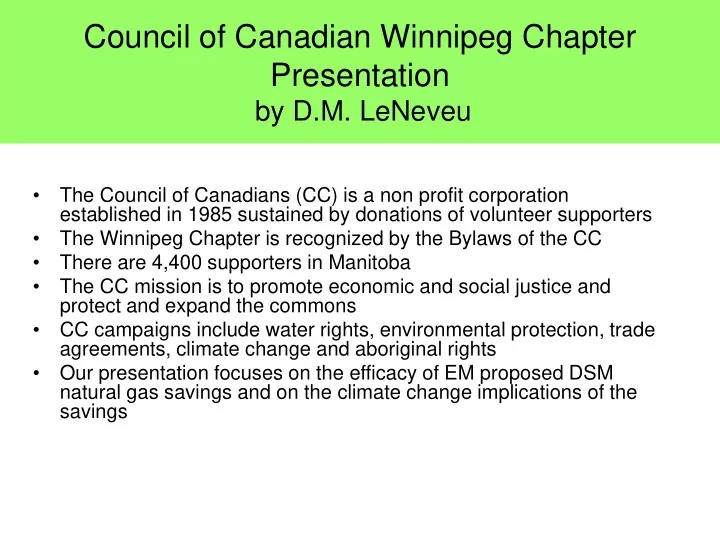

Council of Canadian Winnipeg Chapter Presentation by D.M. LeNeveu • The Council of Canadians (CC) is a non profit corporation established in 1985 sustained by donations of volunteer supporters • The Winnipeg Chapter is recognized by the Bylaws of the CC • There are 4,400 supporters in Manitoba • The CC mission is to promote economic and social justice and protect and expand the commons • CC campaigns include water rights, environmental protection, trade agreements, climate change and aboriginal rights • Our presentation focuses on the efficacy of EM proposed DSM natural gas savings and on the climate change implications of the savings
The Efficiency Manitoba Act Provisions We Address Mandatory considerations 11(4) (b) the benefits and cost- • effectiveness of the initiatives proposed in the plan • Efficiency Plans 9(e) an analysis of the reductions in greenhouse gas emissions in Manitoba expected to result from the initiatives proposed • Natural Gas Savings Targets incremental net savings that are at least equal to 0.75% of the consumption of natural gas in the immediately preceding year. Regulations — general prescribing factors which the PUB • must consider h(ii) the societal benefits to be achieved by all or a portion of Efficiency Manitoba's initiatives • Definitions: "consumption" means on a weather-adjusted basis
Manitoba GHG Emissions 25 20 Total MB GHG in Mt CO2e per year Stationary Combust Transport 15 Agriculture Paris Target 10 MB Savings Acct Natural Gas Combust 5 EM NG 0.75% target Net Zero 0 Sequestration -5 1990 2000 2010 2020 2030 2040 2050 Years
The Efficiency Trap / Jevons Paradox • Growth in consumption always outweighs savings from efficiency • Efficiency measures such as furnace replacement lock in fossil fuel emissions and prevent meeting climate change targets
EM natural gas savings target of 0.75% per year is optimistic Growth Outweighs Efficiency • DSM natural gas savings historically from 2001 to 2018 average 0.32% per annum • Natural gas customer growth from 2001 to 2018 has averaged 0.6% • Why is not natural gas consumption increasing with time?
The decrease in Heating Degree Days driven by climate change reduces natural gas consumption Heating Degree Days - Natural Gas Emissions - Natural Gas Consumed HDD (deg C) - GHG (kt/year)- Gas 6000 Consumed (Mm3/year) Heating Degree Days 5000 NG Emissions kt/a HDD Linear Fit 0.47%/a decrease 4000 GHG Linear Fit 0.24%/a save HDD extrapolated 3000 EM 0.75%/a Target Gas Consumed Mm3/a 2000 Gas Linear Fit 0.24%/a save 1000 0 1995 2003 2011 2019 2027 2035 Year
Heat Pumps beat natural gas heating for efficiency and GHG emissions Heating Cost for Recent 2 Storey 2000 sq. Foot Home 2500 mid eff no tax 2000 mid eff plus carbon tax heating cost $ per year high eff plus carbon tax 1500 high eff no tax 1000 geothermal 3.36% yearly increase electric 3.36% yearly 500 increase air to air heat pump 3.36% 0 2017 2018 2019 2020 2021 2022 2023 year
Conclusion and Recommendations • Weather adjusted consumption of natural gas based on HDD should result in 1) Growth in natural gas consumption will outweigh savings from EM efficiency measures consistent with Jevons Paradox 2) the 0.75% annual natural gas savings target will not be met 3) NPV natural gas savings benefits will be negative invalidating all the PACT cost test and LRI (lifecycle revenue impact) calculations • EM natural gas efficiency measures such as furnace replacement will lock in GHG emissions for decades and prevent emissions reduction. • Heat pumps are more effective for natural gas savings and greenhouse gas reduction than increased efficiency of natural gas combustion • To benefit society the PUB should hold hearings on climate change mitigation that brings together MB Hydro, Centra and EM • EM plans should include 1) transition away from fossil fuels including natural gas, 2) replacement of incentives for more efficient natural gas heating with heat pump replacement programs designed to meet climate change targets.
Recommend
More recommend